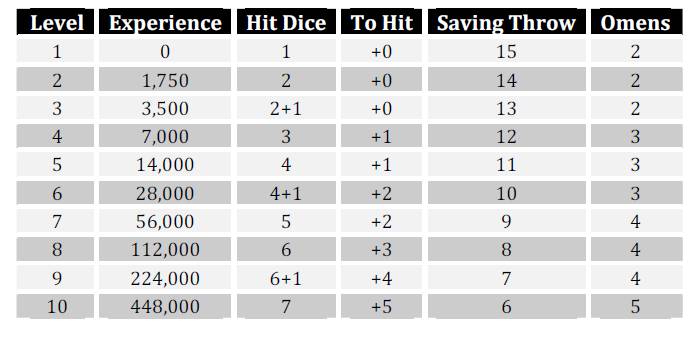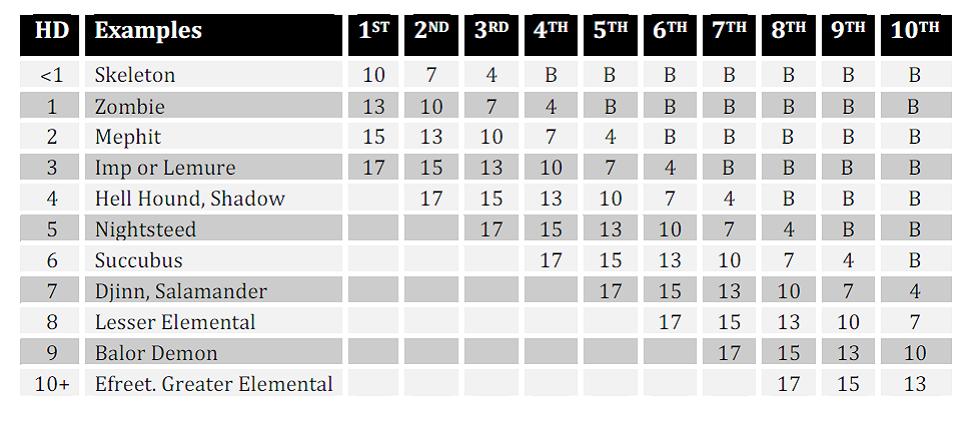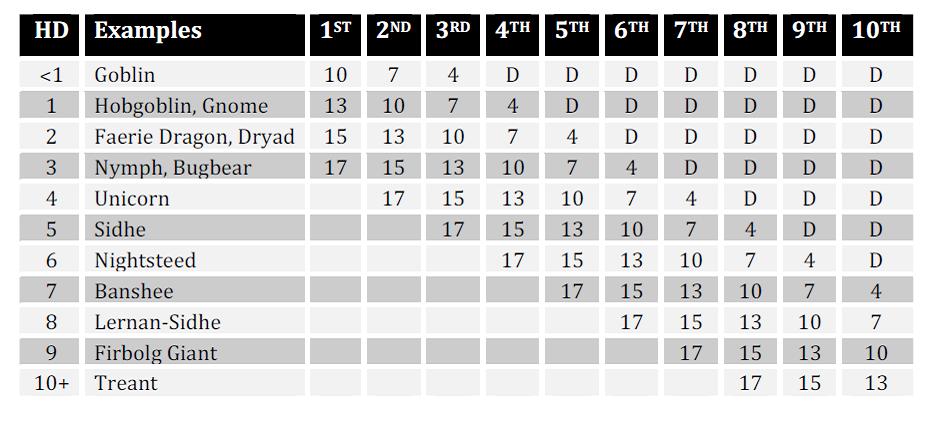THE DEMONIST
Phil Master's 'Demonist' appeared in White Dwarf 47 (1983) and was an "extra-planar specialist"combining clerical and magic-user abilities to summon and control elementals, demons and otherworldly powers. This is a revised version of the Demonist for White Box.
Demonists are students of the Otherworld: the realms of the elementals, demons, shadows and nameless entities. They seek guidance from their supernatural patrons and learn to invoke (summon) and bind (control) beings from these worlds in the pursuit of power and esoteric knowledge.
Demonists are usually Human but at the Referee's discretion Half-Orcs can advance as Demonists up to 6th level and Elves up to 8th level. Demonists must be Neutral or Chaotic. Their Prime Attribute is Wisdom, representing strength of will and they add +05% to earned XP if this is 15+.
Demonists are usually Human but at the Referee's discretion Half-Orcs can advance as Demonists up to 6th level and Elves up to 8th level. Demonists must be Neutral or Chaotic. Their Prime Attribute is Wisdom, representing strength of will and they add +05% to earned XP if this is 15+.
Armour & Weapon Restrictions
Demonists can wear leather armour and carry shields. They can use one-handed weapons in combat (not bows). They can use magic items available to anyone, but also items for controlling elementals, cloaks of protection, magic gauntlets and magic horns.
Binding Spirits
Demonists can bind spirits to their will. This is done in the same way as a Cleric turning undead. Binding can only be attempted once for a group of otherworldly monsters. If successful the group serves the Demonist, although more intelligent creatures may do so with complaint and without enthusiasm.
Demonists can only have one group of each monster type bound at any time. If the Demonist tries to bind a new monster of that type, the old group is immediately freed from control - whether the Demonist succeeds in the new Binding attempt or not.
A 'B' result means the creatures are automatically Bound to serve the Demonist and any previously Bound creatures of that type are dismissed back to their home realm (or destroyed, in the case of mindless undead) and pose no threat.
A 'B' result means the creatures are automatically Bound to serve the Demonist and any previously Bound creatures of that type are dismissed back to their home realm (or destroyed, in the case of mindless undead) and pose no threat.
Invoking
The Demonist can spend 1d6 turns creating an invoking circle for a particular creature, then roll on the Binding Table (above) to summon it into the circle. The attempt costs the Demonist 1HP of blood per Hit Die of the creatures being summoned and the Demonist can only invoke a maximum number of Hit Dice equal to her level. The player rolls on the table above: if successful, the creature appears in the circle, on a failure nothing happens.
Hit Points sacrificed this way are healed normally if the invoking fails, but if the invoking succeeds the Hit Points are irrecoverable until the invoked beings depart this world or are destroyed.
The invoked beings need to be Bound to the Demonist's will. If this fails, the creature remains hostile to the Demonist but cannot leave the circle or use magic powers (but watch out for Demons with Psionics!). Most unbound demons or elementals will return to their own world, but some will remain in the circle, purely to deprive the invoker of the Hit Points she sacrificed to get them there. Unintelligent monsters must be fought and destroyed to get rid of them. Of course, the Demonist could release an uncontrolled being in the hope that it is helpful, but Reaction Tests with invoked creatures are at -2.
Hit Points sacrificed this way are healed normally if the invoking fails, but if the invoking succeeds the Hit Points are irrecoverable until the invoked beings depart this world or are destroyed.
The invoked beings need to be Bound to the Demonist's will. If this fails, the creature remains hostile to the Demonist but cannot leave the circle or use magic powers (but watch out for Demons with Psionics!). Most unbound demons or elementals will return to their own world, but some will remain in the circle, purely to deprive the invoker of the Hit Points she sacrificed to get them there. Unintelligent monsters must be fought and destroyed to get rid of them. Of course, the Demonist could release an uncontrolled being in the hope that it is helpful, but Reaction Tests with invoked creatures are at -2.
Omens
A Demonist can consult the omens a number of times per day equal to his Omens rating. The Referee will give a verdict on a proposed course of action (in the next 15 minutes): beneficial, harmful, mixed or no consequences.
The Demonist can also use Omens to commune with his otherworldly patrons. This can be attempted once per adventure (or once per month outside adventuring) and the player must roll equal to or less than their Omens score to receive advice or information about the dungeon or the campaign setting. The Referee provides the Demonist with a true and relevant rumour.
The Demonist can also use Omens to commune with his otherworldly patrons. This can be attempted once per adventure (or once per month outside adventuring) and the player must roll equal to or less than their Omens score to receive advice or information about the dungeon or the campaign setting. The Referee provides the Demonist with a true and relevant rumour.
Saving Throws
Demonists save at +2 vs the powers of otherworldly creatures that they can bind and invoke.
Establish a Fanum
At 9th level, the Demonist gains the title 'Master of Demons' (or something equally grandiose and macabre) and can build a Fanum, which is a sort of temple-laboratory dedicated to invoking otherworldly powers and opening portals to other realms. He will attract a group of strange and/or desperate servitors - soldiers, clerics, magic-users and lesser demonists, monsters, earthbound spirits - who will serve him in pursuit of their own weird agendas.
Trauma
Demonists gain no Trauma from the manifestation of otherworldly beings (obviously), from the deaths of companions (they're pretty cold) or from being alone in dark or dangerous places (they know what's in the darkness - and they quite like it!).
Demonist Feats
- Abjuration: you can cast detect law/chaos and protection from law/chaos once a day each; if you choose this a second time you can also cast dispel law/chaos once a day
- Augury: Increase your Omens rating by 1
- Demon Tongue: invoked creatures do not suffer the -2 Reaction penalty when dealing with you
- Focus: The Demonist's weapon becomes the Focus for invoking, binding and reading Omens and the Demonist cannot use these powers without it. It takes a week to consecrate a new Focus. The weapon gains +1 To Hit and damage and is treated as a magic weapon. If it is a magic weapon, it's To Hit Bonus is added to rolls on the Binding Table.
- Soul Shield: The Demonist gains +2 on all saving throws against mind control and cannot be possessed
- Spirit Sight: The Demonist can detect disembodied spirits or creatures possessed by a spirit
- Uncanny Luck: Your rolls of natural-19 count as natural-20
- Word of Binding: You bind spirits as if you were one level higher
Fey Demonists (Changelings)
Demonists could be aligned with the powers of Faerie rather than the Outer and Elemental Planes. Fey Demonists are Changelings if their power comes from possessing a fey soul rather than a mortal one - perhaps because they were exchanged at birth.
Changelings follow the same rules as Demonists, but can be Humans, Elves or Gnomes, with non-humans limited to 8th level. Their saving throw bonus is against the abilities of fey creatures and illusions. Unlike other Demonists, they can wear chainmail armour.
Instead of demons and elementals, Changelings can Invoke and Bind fey monsters.
Changelings follow the same rules as Demonists, but can be Humans, Elves or Gnomes, with non-humans limited to 8th level. Their saving throw bonus is against the abilities of fey creatures and illusions. Unlike other Demonists, they can wear chainmail armour.
Instead of demons and elementals, Changelings can Invoke and Bind fey monsters.
This follows the White Box implication that goblins, hobgoblins and bugbears are fey creatures; if you don't interpret them this way, remove them and allow Changelings to Invoke/Bind Skeletons and Zombies like other Demonists.




